

UN panel on climate change presents gloomy picture for Asia in its fresh report. Entire marine food chain at risk from rising CO2 levels in water. Escalating carbon dioxide emissions will cause fish to lose their fear of predators, potentially damaging the entire marine food chain, joint Australian and US research has found.
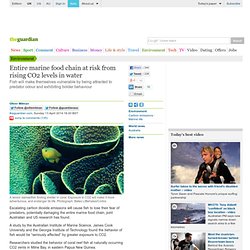
We're offering $2m for the best ocean acidity mapping - environment - 14 April 2014. Climate change and rising CO2 will reduce quality of food. Elevated levels of carbon dioxide can block plants' absorption of nitrates, leading to foods and crops with a reduced nutritional quality, new field trials have found.
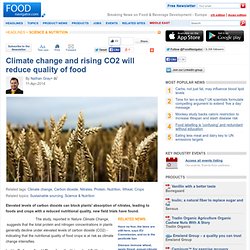
The study, reported in Nature Climate Change, suggests that the total protein and nitrogen concentrations in plants generally decline under elevated levels of carbon dioxide (CO2) - indicating that the nutritional quality of food crops is at risk as climate change intensifies. Led by Professor Arnold Bloom from the University of California - Davis , the findings are based on data from field trials involving wheat that was grown in an environment richer in CO2, which showed that crops grown in an environment where CO2 is higher have a reduced ability to process nitrogen. "Food quality is declining under the rising levels of atmospheric carbon dioxide that we are experiencing," said Bloom. 3% protein decline expected Study details.
Overview of Impacts of Climate Change and Adaptation in China's Agriculture. Abstract The purpose of this paper is to document the likely impacts of climate change on China's agriculture and the current adaptation efforts made by government and farmers.
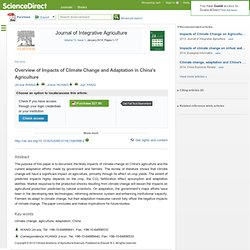
The review of literature shows that climate change will have a significant impact on agriculture, primarily through its effect on crop yields. The extent of predicted impacts highly depends on the crop, the CO2 fertilization effect assumption and adaptation abilities. Market response to the production shocks resulting from climate change will lessen the impacts on agricultural production predicted by natural scientists. On adaptation, the government's major efforts have been in the developing new technologies, reforming extension system and enhancing institutional capacity. Key words. Climate: Farming emissions to rise 30% by 2050.
Greenhouse gases emitted by agriculture are on track to rise by 30 percent by mid-century, driven especially by livestock and use of fertiliser, a UN agency reported on Friday.
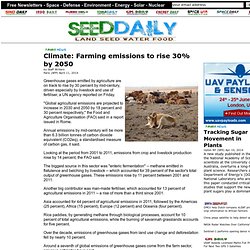
"Global agricultural emissions are projected to increase in 2030 and 2050 by 18 percent and 30 percent respectively," the Food and Agriculture Organisation (FAO) said in a report issued in Rome. Annual emissions by mid-century will be more than 6.3 billion tonnes of carbon dioxide equivalent (CO2eq), a standardised measure of carbon gas, it said. Looking at the period from 2001 to 2011, emissions from crop and livestock production rose by 14 percent, the FAO said.
Bad weather prompting more British farmers to favour GM use. Get used to 'extreme' weather, it's the new normal. School children encounter flood water after heavy rains in Jhabua, central India.
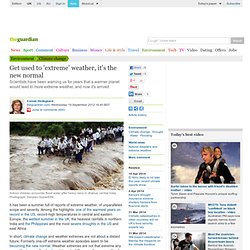
Photograph: Sanjeev Gupta/EPA It has been a summer full of reports of extreme weather, of unparalleled scope and severity. Among the highlights: one of the warmest years on record in the US, record-high temperatures in central and eastern Europe, the wettest summer in the UK, the heaviest rainfalls in northern India and the Philippines and the most severe droughts in the US and east Africa. In short, climate change and weather extremes are not about a distant future. Formerly one-off extreme weather episodes seem to be becoming the new normal. And this should not come as a surprise. And although not every extreme weather event can be attributed to climate change, scientists are now much more confident about linking individual weather events to climate change. This summer continued the pattern. But isn't it too costly to invest in a low-carbon world, some may ask?
IPCC Warns Of Greater Risk To Food & Water Security. By Science and Development Network | EditorialsApril 11, 2014 The Fifth Assessment Report warns that climate change will threaten food and water security, especially for Asia.
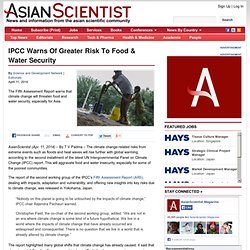
AsianScientist (Apr. 11, 2014) – By T V Padma – The climate change-related risks from extreme events such as floods and heat waves will rise further with global warming, according to the second installment of the latest UN Intergovernmental Panel on Climate Change (IPCC) report. NFU Mutual faces £20m flooding bill - 28/11. Rural insurer NFU Mutual is facing a £20m bill to cover the cost of flooding, with parts of the country braced for more heavy rain today (27 November).
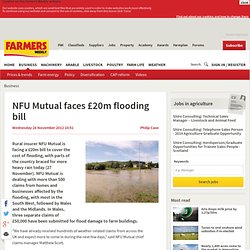
NFU Mutual is dealing with more than 500 claims from homes and businesses affected by the flooding, with most in the South West, followed by Wales and the Midlands. In Wales, three separate claims of £50,000 have been submitted for flood damage to farm buildings. "We have already received hundreds of weather-related claims from across the UK and expect more to come in during the next few days," said NFU Mutual chief claims manager Matthew Scott. "Although it's too early to put an accurate figure on the cost of claims, we could be looking at a total bill of up to £20m for NFU Mutual alone. " In addition to flooded farms, many rural businesses such as hotels, shops, offices and workshops have also suffered extensive damage, the insurer said. Vehicles have been hard hit, with claims for flooded cars, tractors and harvesting vehicles reported.
Wet Weather Requires Slurry Spreading Period Lengthened - The Cattle Site. News Wet Weather Requires Slurry Spreading Period Lengthened 14 November 2012 UK - The NFU's Environment Team has released their monthly newsletter. Flood management and slurry spreading are some of the key issues discussed with the wet autumnal weather causing problems. Exceptional rainfall has caused many farmers difficulty regarding spreading sufficient slurry to empty their stores prior to the closed periods. Defra has extended the slurry spreading 'window' by 4 weeks on soil types other than sandy or shallow, but continued rainfall and waterlogged conditions over this period, together with the late stage of the season, makes it likely that there will be chronic slurry spreading issues for much of the winter period.
Defra IS expected to issue advice to farmers on actions they should take in the circumstances, via its website. Waterproofing Crops: Effective Flooding Survival Strategies. © 2012 American Society of Plant Biologists. All Rights Reserved. Julia Bailey-Serres*, Seung Cho Lee and Erin Brinton + Author Affiliations ↵*Corresponding author; e-mail serres@ucr.edu. Plant Physiology December 2012 vol. 160 no. 4 1698-1709. Farmers count cost of wet weather - 26/11. Farmers are counting the cost of the wet weather after yet more heavy rain brought autumn drilling and cultivations to a standstill.
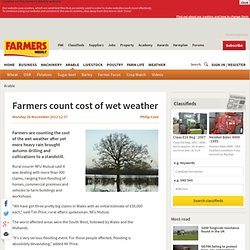
Rural insurer NFU Mutual said it was dealing with more than 300 claims, ranging from flooding of homes, commercial premises and vehicles to farm buildings and workshops. "We have got three pretty big claims in Wales with an initial estimate of £50,000 each," said Tim Price, rural affairs spokesman, NFU Mutual. The worst affected areas were the South West, followed by Wales and the Midlands. "It's a very serious flooding event. For those people affected, flooding is absolutely devastating," added Mr Price.
Heat tolerant crops. By Dennis O'BrienMarch 22, 2013 A U.S.
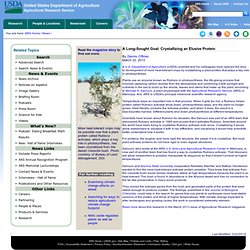
Marine agriculture tackles water scarcity issue. Costa Rican academics are pioneering the growth of crops on freshwater lakes as a way of addressing food shortages.
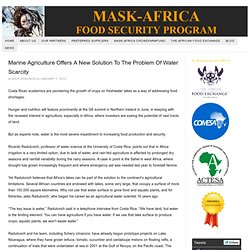
Hunger and nutrition will feature prominently at the G8 summit in Northern Ireland in June, in keeping with the renewed interest in agriculture, especially in Africa, where investors are eyeing the potential of vast tracts of land. But as experts note, water is the most severe impediment to increasing food production and security. Ricardo Radulovich, professor of water science at the University of Costa Rica, points out that in Africa irrigation is a very limited option, due to lack of water, and rain-fed agriculture is affected by prolonged dry seasons and rainfall variability during the rainy seasons.
A case in point is the Sahel in west Africa, where drought has grown increasingly frequent and where emergency aid was needed last year to forestall famine.